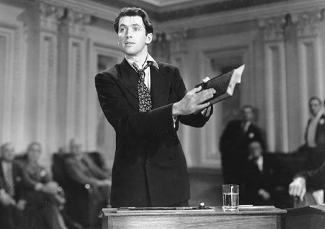No, not that Mr. Smith, the other one, Gregory W. Smith, the former program director of the “royalty-in-kind program” at the Interior Department.

Gregory Smith is one of 19 officials (about one-third of the program’s staff) who accepted gratuities from oil companies including Chevron and Shell, while conducting official business.
As the New York Times reported (Sept. 11), the Interior “…department’s inspector general, Earl E. Devaney, found wrongdoing by… former employees of the Minerals Management Service, which collects about $10 billion in royalties annually and is one of the government’s largest sources of revenue other than taxes.”
“A culture of ethical failure” is how Devaney described actions by the Interior Department. Among the specific allegations against Gregory Smith, the report cites:
“Mr. Smith improperly used his position… to help a technical services firm seek deals with the same oil and gas companies. The services firm paid Mr. Smith more than $30,000 for asking the oil companies to hire it.
“Mr. Smith… misled the [Interior Dept.] into thinking he would be performing technical consulting, rather than marketing the firm to companies with which he also conducted official business.”
Mr. Smith “…improperly [accepted] gifts from the oil and gas industry… [Engaged] in sex with two subordinates, and [used] cocaine that he purchased from his secretary or her boyfriend several times a year…
“Mr. Smith lied to investigators about these and other incidents, and… urged the two women subordinates to mislead the investigators…”
Mr. Devaney “…urged the administration to take administrative action against several of the officials… But two of the highest-ranking officials… will apparently escape sanction. Both retired during the investigation, rendering them safe from any administrative punishment, and the Justice Department has declined to prosecute them on the charges…” As of this writing, the Justice Department has offered no explanation.
Watching the Frank Capra classic last night, I was struck by some similarities.
Jimmy Stewart tries to fight a corrupt politician sponsored by a corporate bully. In today’s incarnation, the corporate bully is played by several oil companies. The Jimmy Stewart part is played by the Interior Department’s own inspector general, Earl Devaney. And just like Stewart’s stalwart, junior senator, Devaney has gained his own attention-grabbing headlines.
However, near the end of “Mr. Smith,” the corrupt Senator Paine ultimately confesses the truth behind the scheme, vindicating Smith. But the film ends before we ever get to see any significant change in Washington. It’s assumed.
Inspector General Devaney’s report has made national headlines, exposing the truth. But will we ever get to see any meaningful change?
Both presidential candidates have routinely made “change in Washington” part of their campaign mantras. In fact, in his convention speech, Senator McCain said, “We lost the trust of the American people when some Republicans gave in to the temptations of corruption.”
Last night, in a forum at New York’s Columbia University, Senator Obama stressed the need to “…bring transparency and accountability to Washington.”
If McCain and Obama are serious about the change they advocate, they must recognize that before they can deal with the economy, before healthcare, education, even before dealing with the war in Iraq, they need to start with reforming howgovernment operates.
They need to develop and implement significant ethics reform; the kind that makes clear that if anyone violates the trust of the American people, they will be held accountable and face the full force of consequences, even if they’ve retired from office.
In spite of its sentimental idealism, “Mr. Smith Goes to Washington” is the ultimate lesson in “Country First.” It’s a lesson that all members of congress should revisit if they are ever to regain the trust of the American people.
Comments










